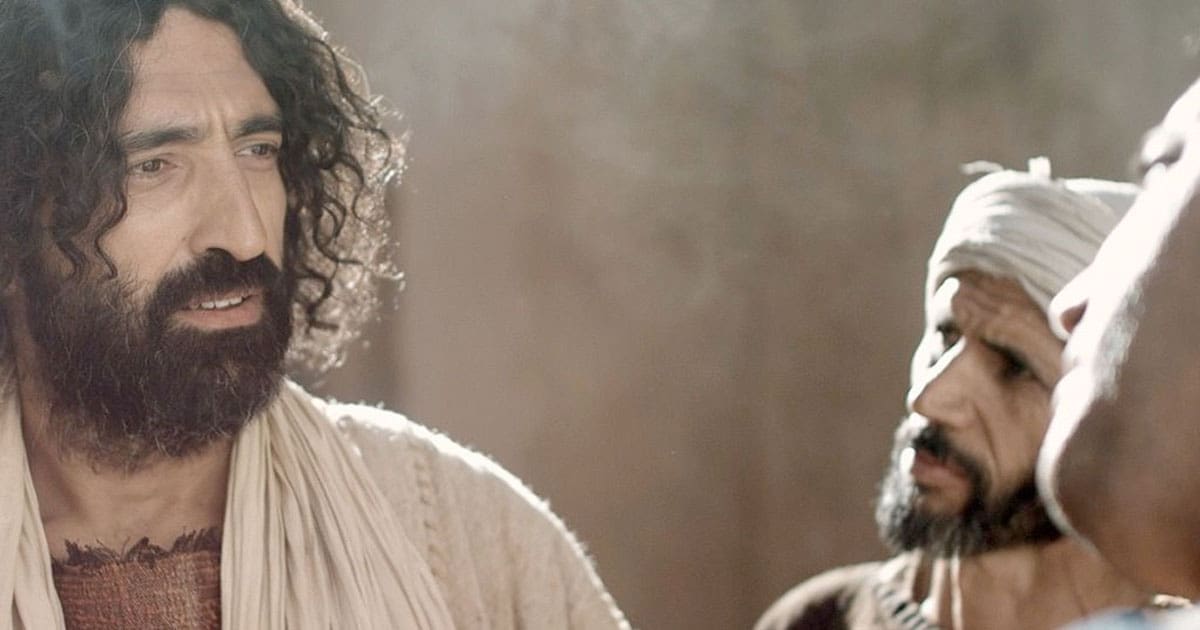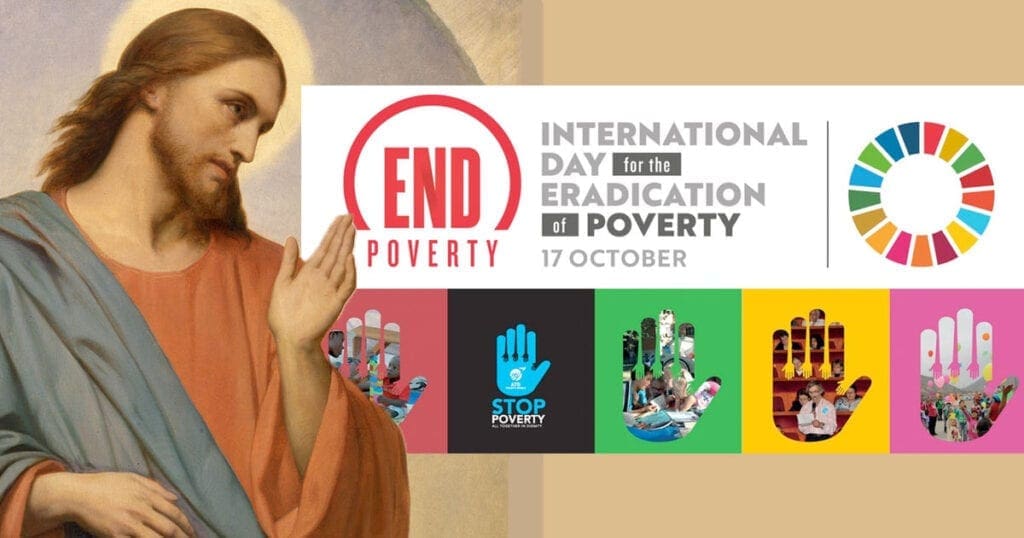Jesus vs. the UN on the Eradication of Poverty
Jesus vs. the UN – World Day on the Eradication of Poverty (10/17)
October 17th marks the UN’s World Day for the Eradication of Poverty calling us to work toward overcoming poverty. But what is the use of all our efforts at systemic change? After all, in three different places Jesus tells us “the poor will always be with you” (Matt 26:11, John 12:11 and Mark 14:7).
More than a few understand this to mean that a) that we can never end poverty, b) that it is the role of Christians, not the government, to try to care for the poor, or c) that Jesus rather than the poor should be our concern.
I must admit the question that has long been in the back of my mind. especially in light of the Vincentian Family thrust of Systemic Change. However, I recently read “Understanding “the poor will always be with you.” It helped me realize that Jesus was really saying quite the opposite of the above interpretations. The author pointed out that we miss the point when we read the passage from our own historical context.
We think we understand what Jesus is saying but we do not.
First, a quick observation… The word “Madonna” evokes quite different images across the age spectrum. To anyone coming of age prior to the 1980’s Madonna would clearly mean the Mother of Jesus. To those who came of age after the 1980’s the more frequent association is with Madonna, an entertainer always pushing the envelope. Our time-conditioned cultural experience shapes us and our understanding of words
Something similar happens with Jesus’ words on poverty. When we read that Jesus says, “The poor will be with you always” we read it without any awareness of the mindset of the people of Jesus’ time.
The Jews of Jesus’ day would have understood that passage in the light of what they grew up with. They would have immediately recognized the words as a quote from the Book of Deuteronomy. Chapter 15 of the book of Deuteronomy explains that if people follow God’s commandments there will be no poverty. In fact, this passage lays out the Sabbath and Jubilee prescriptions that are given so that the people of God know what to do to ensure that there is no poverty – that God’s bounty is enjoyed by all. It concludes that because people do not follow what God has laid out, “there will never cease to be some in need on the earth” (or, “the poor you always have with you”), and because of that, it is our duty to God to “open your hand to the poor and needy neighbor.”
They would have known that God had another program for addressing poverty. Rather than selling something valuable and donating the money to the poor, the people of God were supposed to be organizing their society to enact the Jubilee. Systemic Change?
So returning to Deuteronomy 15 and the passage from Matt 26, Jesus is demonstrating that poverty need not exist, and therefore that the poor will not need loans or charity, if people follow God’s laws and commandments, especially through living out the “Sabbatical Year” and “Jubilee.”
Therefore, Jesus is criticizing the disciples with this echo of Deuteronomy 15:11, where it is established that poverty is the result of society’s disobedience to God and of following the laws and commandments of empire.
Jesus challenges us
Rather than Jesus giving us a pass on poverty, he is issuing a profound challenge.
The author continues…
I believe there is a four-leveled critique of charity from the Scriptures and Jesus’s teachings found in Matthew 26:
-
- ideological (challenging the belief that charity demonstrated how much the rich cared about the poor),
- political (showing how patronage actually helped the wealthy to gain a political base and following),
- spiritual/moral (exploring how charity and patronage are directly tied to state religion, the imperial cult, and religious expressions that actually justify inequality), and
- material (explaining how charity, benefaction, and patronage made more money for the wealthy and at the same time did not meet the needs of the poor).
Indeed thought-provoking!
Food for thought
Does the above give another biblical basis for the Vincentian Family’s emphasis on collaboration and systemic change?
How many other words of Jesus do we misunderstand because we do not know the thought patterns of the people of his time?
Is this a reason why Pope Francis brands the bible as a dangerous book?
This is an adapted version of a post that originally appeared on VincentiansUSAEast








Useful insight into those words… Thanks
Very helpful analysis, John. Since the awarding the Memorial Nobel Prize in Economics earlier this week I have wanted (and now will!) study the work of Abhijit Banerjee, Esther Duflo and Michael Kremer who are “essentially credited with applying the scientific method to an enterprise (effort to end global poverty) that was largely based on gut instincts.” The quote comes from NPR.
While I have trouble imagining a world with no poverty at all since there always will be people who fall ill (physically or mentally), become addicted, cannot work, make poor decisions, etc. and I seriously doubt we will eliminate greed and the desire to for more and more and more, especially on the part of those who already are at the top of the economic heap, we surely can do better than we are. Perhaps these very smart people have figured out something that, when combined with limitless love, will super-charge our efforts.
I best wrap up this message. I have a LOT of reading to do.
Thank you.
I too have been following these Nobel prize winners. What I have read is fascinating.
Yes. And Yes. This can provoke so much thought. He is anointed in anticipation of burial, the initiation of the new heavens and new earth. Keep your development model of selling the fruits of excess to give to the poor, He says. Participate in the coming reign. She gets it. She should be remembered. But she is forgotten. As was the lesson, says the Evangelist.
From Denis Hamm, S.J., https://www.americamagazine.org/issue/566/article/dodging-faiths-call
The Poor Among Us
“The poor you will always have with you” (Matt 26:11; Mark 14:7; John 12:8).
According to the Gospels of Matthew, Mark and John, Jesus makes this observation during a dinner in Bethany, early in the final week of his life. Since Mark provides the fullest version of Jesus’ response, let us consider his account. (I use the Revised Standard Version translation because it renders the Greek more accurately than most other versions.)
A woman—nameless in Mark—enters the dining area with an alabaster jar of expensive ointment, breaks it and pours it over Jesus’ head (the way ancient Israelites used to anoint kings).
Some, infuriated, say to themselves indignantly, “Why was the ointment thus wasted? It could have been sold for more than three denarii, and given to the poor.” They are infuriated with her. But Jesus says:
Let her alone. Why do you trouble her? She has done a beautiful thing to me. For you always have the poor with you, and whenever you will, you can do good to them; but you will not always have me. She has done what she could; she has anointed my body beforehand for burying. And truly, I say to you, wherever the gospel is preached in the whole world, what she had done will be told in memory of her. (Mark 14:4-9 RSV)
Several points stand out:
1. Jesus’ words are not primarily about the poor but about himself. Jesus’ interpretation serves as his fourth prediction of his death (see Mark 8:31, 9:31 and 10:33). Mark likely expects his readers to make connections between the (king-like) anointing of Jesus’ head, the reference to his approaching death and his status as Anointed One (Messiah/Christ) achieved in death and resurrection.
2. The reference to the poor is not a prediction. While the NAB translates the Greek verb in the future tense, “will always have,” the original Greek is the present tense, “always have.” Jesus is not looking to the future, but using a recurring human situation (people in need) to highlight the uniqueness of this moment (Jesus’ presence with them at one of his last meals).
3. Jesus’ statement is a quotation from the jubilee legislation of Deuteronomy 15:
If one of your kinsmen in any community is in need in the land which the Lord, your God, is giving you, you shall not harden your heart nor close your hand to him in his need. Instead, you shall open your hand to him and freely lend him enough to meet his need. …The needy will never be lacking in the land; that is why I command you to open your hand to your poor and needy kinsman in your country. (Deut 15:7-8, 11)
Here again, reference to the poor is clearly not a prediction of a permanent underclass. Rather, the text implies a mandate to help people in economic need. Indeed, as we hear a few verses earlier in that passage, “Since the Lord your God will bless you abundantly in the land he will give you, there should be no one of you in need” (Deut 15:4).
Thus, the best response to those who would quote Matt 26:11; Mark 14:7 in support of a policy of “benign neglect” of the poor is simply to cite Mark’s fuller version, and to note the obvious allusion to Deut 15:11. Clearly, Mark would have us hear Jesus’ statement in that context.
Thanks, Ross for tracking down this 2006 article.